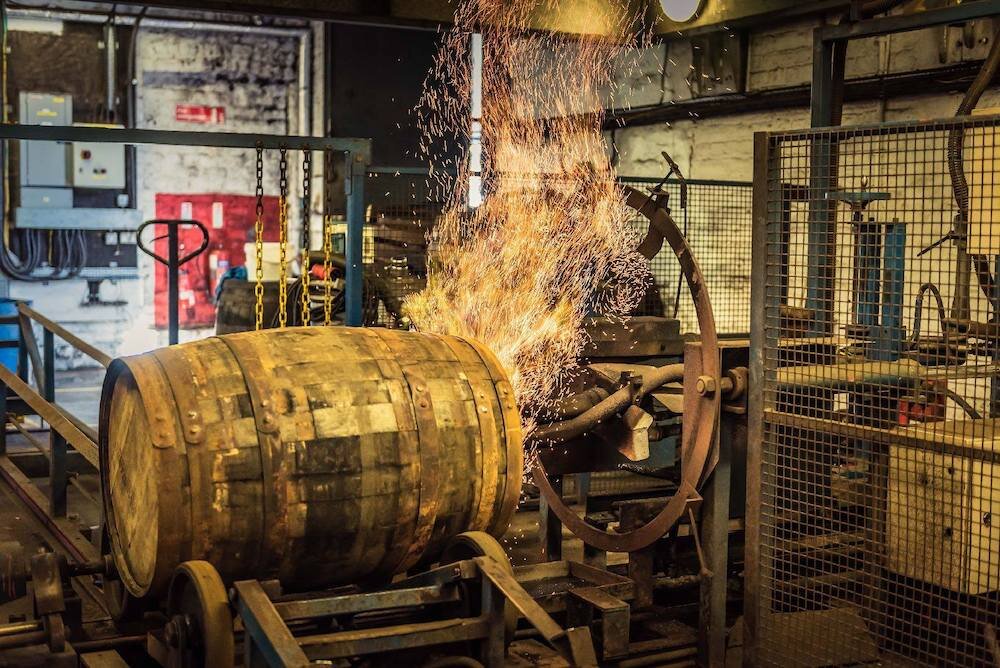Loch Lomond 14 - Whisky & Wild Review 3
When you first start tasting whisky, those around you often wax lyrical about fruit.
‘I’m getting pears, hints of green apple’
You nod along, thinking all the time that it tastes a lot like whisky. You cast your eyes downward into your glass before searching the room for other confused faces. Did I pick up the wrong glass? Is this host tasting fruit or are they just plain nutty?
Sometimes both are true...
So, we come to Loch Lomond 14. So firmly in the fruit camp that they have named it ‘Fruit & Cinnamon’. One of our favourite drinking drams of the summer originally recommended to us by Brian from Malt Musings.
Loch Lomond is a distillery that has a reputation for experimentation at the earlier stages of the process. They have a unique set up of straight neck pot stills and use a longer than average fermentation time to boost the flavour of the new make producing fruit notes even at wash stage. Loch Lomond 14 also has a very narrow spirit cut which again, retains a lot of sweetness.
All of these decisions are made by Michael Henry, the Master Blender at Loch Lomond. He has a great deal of choices at the Distillery due to the range of stills, the different yeasts they use and their on-site Cooperage.
He explained the varied spirit styles in a 2018 Master of Malt interview.
‘We have two shapes of stills: a set of traditional swan neck stills like you’d see in other distilleries, and then we have three sets of straight neck pot stills that are unique to us. The straight neck pot stills, we can run those in two ways. The first is we can take a very tight cut on the spirit run and collect the new make spirit at 85% strength. And the second is to take a wider cut on the spirit run and collect about 65% strength. So with those two still types and running the second type of still two different ways, that gives us three unpeated spirit styles. And we use, in addition to the flavour difference, different yeast on each type of still. So we use a more floral yeast for the swan neck stills and a kind of yeast that gives more fruit character for the straight neck pot stills. And those are three main unpeated spirit styles for single malt. And we then do different peat levels of each of those. So we do a medium peat version of two of them and then the medium peat’s 25 PPM (parts per million). And then we do a heavily peated version of each style, so that’s another three heavy peated styles. So that gives us three unpeated, two medium peated and three heavy peated styles. So eight in total..’
Still with us? All of this complexity is before they get to cask styles. And this is where Loch Lomond 14 takes another turn.
Toasting casks on site at Loch Lomond
The bulk of the years are in American Oak refills. So far, this bourbon aging is a classic approach but the spirit is then finished in French Limousin new oak, lightly toasted. These quirky casks are very unique and made especially for LL 14. We can only assume this charred new oak is to balance all the fruit (that word again) packed into the spirit through the process.
So let’s taste shall we?
Bottled at 46% with no chill filtering or colouring
Nose: Over ripe orange, wood spice. A neat balance of drying wood and ripe, late summer fruit.
Larkfire: With just a few drops the fruit freshens, apple peel and cinnamon
Palate: Bourbon sweetness, Apple Tango (sorry) and sweet Pear. The vanilla sweetness slightly hides the fruit but the fudge and caramel delivers a wonderful mouthfeel. The drying wood spice adds balance and delivers a spicy edge.
Larkfire: With a few drops, the complexity of this dram is opened. The fruit freshens and the sandalwood spice and soft pepper is clearer and cleaner.
Finish: Longer than expected. A spiced apricot muffin with fading fruit, leaving a pleasant peppery tang.
The straight necked pot stills and spirit safe (foreground)
It’s safe to say we love this dram and have been struggling with the perennial ‘leaky bottle’ problem. This is a problem that occurs when the level in your bottle slips down seemingly through no fault of your own. Quite puzzling.
It is also a wonderful way to understand how a fruit forward new make and cask choice can deliver great flavour. You WILL taste fruit in this dram and it was particularly interesting how Larkfire opened up and delivered fresher, slightly dryer fruit.




